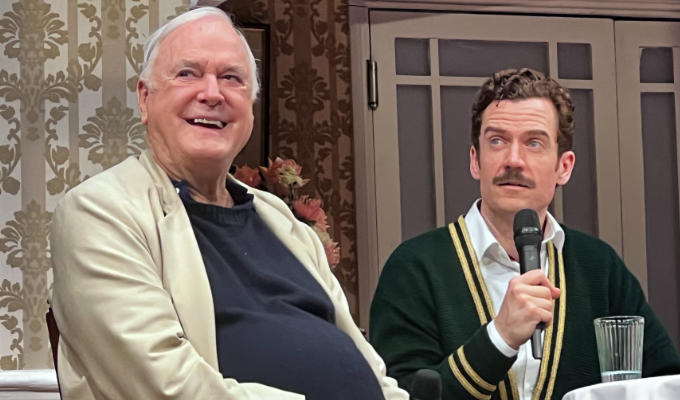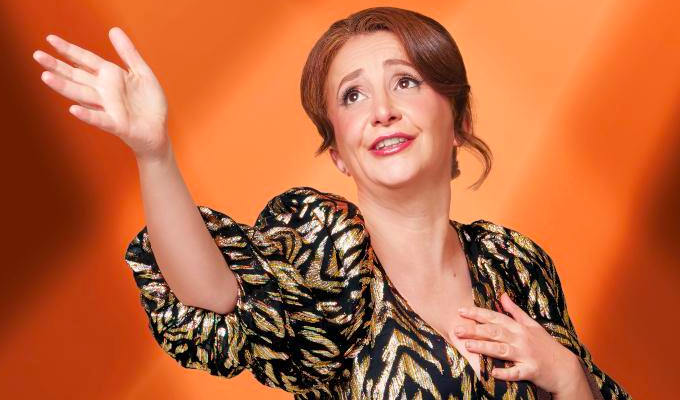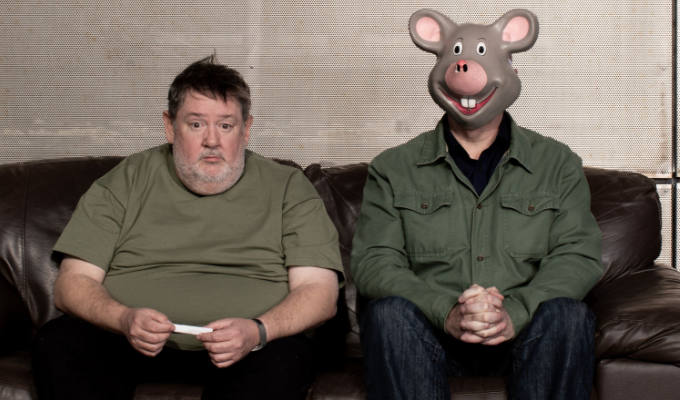 © Chortle
© Chortle John Cleese: The literal-minded are the enemy of comedy
Comedy legend speaks at the launch of the Fawlty Towers play
John Cleese says he has a problem with ‘the literal-minded’ responding to his comedy, as they don’t get the jokes.
Speaking at he launch of the stage version of Fawlty Towers in London, the comic said such people should not be listened to when judging humour.
‘Whenever you're doing comedy, you're up against the literal-minded,’ he said. ‘And the literal-minded don't understand irony, and that means, if you take them seriously, you get rid of a lot of comedy.
‘The literal-minded people don't understand metaphor, they don't understand irony, and they don't understand comic exaggeration. And the result is, these are people who are not understanding what other human beings are saying, and they're not playing on a full deck.
‘Literal-minded people can only have one interpretation of what's being said. People who are not literal-minded can see there are different interpretations depending on different contexts.’
He cited the example of Til Death Do Us Part, with the bigoted Alf Garnett intended to be the butt of the jokes – although not every viewer took that away.
‘People were roaring with laughter at him, not with him,’ he told journalists, including Chortle, gathered in the West End. ‘But there were also people saying "Thank God these things are being said at last".’
Cleese – who has been an outspoken critic of ‘cancel culture’ and ‘woke’ values in the media – admitted that he had edited out some racist ‘racial slurs’ used by The Major (to be played by Paul Nicholas on stage) in adapting the 1970s sitcom.
The new stage show combines the episodes Communication Problems, The Hotel Inspectors and The Germans with a new ending tying all three together – a job Cleese likened to carpentry.
The two-hour play, which was previously staged in Australia, starts performances at the Apollo Theatre on Sunday, opening fully later in the month.
Cleese 84, praised the cast, below, and said they would be ‘tremendous’… but not until June, once the actors had relaxed into their roles.

‘Comedy is all about timing, and what these guys have to learn in the next two or three weeks is where the audience laughs, and whether it's a small laugh or a medium sized laugh or a big laugh… it's going to be a very sharp learning curve, because you just have to take the performance to the audience,’ he said.
The comic was also co-director on the play, but said he didn’t want to be an overbearing one saying: ‘I don't like directors who behave as though they own the whole thing.
‘If you involve a lot of people in the process, everybody becomes creative, they feel much more like ‘ they're part of it. And what I don't like your directors who have a "vision", and everyone else has got to do exactly what they want. Why use the intelligence of one man, but you can have the intelligence as the whole group?’
He also said he didn’t want to dictate too much how Adam Jackson-Fox (pictured above with Cleese) plays Basil, even though it is the role he made famous.
Cleese explained: ’I think of myself as a writer who happens to perform… and if you've written a part, you don't necessarily think that only one person is ever going to play it. After all, there have been a lot of Hamlets.’
He also have a tip for comedy writing, saying scripts should take place in real time as much as possible.
Cleese said: ‘You may have a number of shortest scenes, which is excellent, but if you can cut down the number of time changes, the whole thing acquires more of a momentum, you see. So when Connie [Booth] and I were writing it, we didn't take a time change, unless we absolutely had to. We tried to make it continuous as possible.’
That surely helped the adaptation to the stage – where Cleese says this brand of comedy is best appreciated.
‘Farce is better played in the theatre than anywhere else, because once you're on television or film, then there's a guy called an editor who makes a choice about where you're looking,’ he said. ‘In a [stage[ farce, you want to sit in the middle stalls and see all the different things that are going on at the same time.’
Also at the launch, Hemi Yeroham, who plays Manuel, reveal he hadn’t watched Fawlty Towers before he got the job as he was born and raised in Istanbul.
But he said: ‘It’s a good thing as I approached it fresh. I didn't have to worry too much about fitting into something, I read the script then watched the show, and I saw that [there was a] lovability coming from Andrew Sachs, he had this natural charm… he’s just a loveable man.’
Cleese, who revealed he was suffering from vertigo at the launch, also spoke about each episode of Fawlty Towers taking six weeks to write – with not a line of dialogue written for the first fortnight as they concentrated on plot – and why there were only 12 of them
‘We felt after 12 shows that we'd done the best we could possibly do,’ he said. ‘If we did another series people would probably say "well it was very funny, but it wasn't as good as the first two series". In which case why do it if you're not desperate for the money?’
As well as the stage show, Cleese is planning a TV sequel to Fawlty Towers written with his daughter Camilla and set in a luxury Caribbean resort, run by Basil’s daughter.
• Fawlty Towers: The Play runs from May 4 to September 28 at Apollo Theatre. Tickets available here.
Published: 2 May 2024






